
Updated What Is an AI Video Editor?

What Is an AI Video Editor?
Part 1. What can be called an AI video editor?
An AI video editor refers to a software or system that utilizes artificial intelligence techniques to assist in the editing and enhancement of videos. It can analyze video content, automatically detect and track objects, apply visual effects, adjust colors and lighting, and even generate or suggest edits based on learned patterns and user preferences. An AI video editor is characterized by its ability to intelligently automate various aspects of the editing process, saving time and effort while enhancing the overall quality and creativity of the final video production.
Part 2. What are the features of an AI video editor?
Comparing traditional video editors, an AI video editor can perform various tasks, including but not limited to:
1. Automatic video editing
It can automatically trim, cut, and arrange video clips to create a cohesive and engaging final video.
2. Scene detection
It can analyze the video footage and identify different scenes or segments, making it easier to organize and edit the video.
3. Object recognition and tracking
It can recognize and track specific objects or elements within the video, allowing for advanced editing techniques like adding effects, text, or annotations.
4. Automated transitions and effects
It can suggest or apply transitions, filters, and effects to enhance the visual appeal and storytelling of the video.
5. Intelligent audio editing
It can optimize audio levels, remove background noise, and even generate or recommend suitable background music or sound effects.
6. Content-aware editing
It can intelligently remove or replace elements within the video, such as removing unwanted objects or replacing green screens with other backgrounds.
7. Workflow automation
It can streamline the video editing process by automating repetitive tasks, saving time and effort for content creators.
Overall, an AI video editor harnesses the power of artificial intelligence to simplify and enhance the video editing process, enabling users to create professional-looking videos with greater ease and efficiency.
Part 1. What can be called an AI video editor?
An AI video editor refers to a software or system that utilizes artificial intelligence techniques to assist in the editing and enhancement of videos. It can analyze video content, automatically detect and track objects, apply visual effects, adjust colors and lighting, and even generate or suggest edits based on learned patterns and user preferences. An AI video editor is characterized by its ability to intelligently automate various aspects of the editing process, saving time and effort while enhancing the overall quality and creativity of the final video production.
Part 2. What are the features of an AI video editor?
Comparing traditional video editors, an AI video editor can perform various tasks, including but not limited to:
1. Automatic video editing
It can automatically trim, cut, and arrange video clips to create a cohesive and engaging final video.
2. Scene detection
It can analyze the video footage and identify different scenes or segments, making it easier to organize and edit the video.
3. Object recognition and tracking
It can recognize and track specific objects or elements within the video, allowing for advanced editing techniques like adding effects, text, or annotations.
4. Automated transitions and effects
It can suggest or apply transitions, filters, and effects to enhance the visual appeal and storytelling of the video.
5. Intelligent audio editing
It can optimize audio levels, remove background noise, and even generate or recommend suitable background music or sound effects.
6. Content-aware editing
It can intelligently remove or replace elements within the video, such as removing unwanted objects or replacing green screens with other backgrounds.
7. Workflow automation
It can streamline the video editing process by automating repetitive tasks, saving time and effort for content creators.
Overall, an AI video editor harnesses the power of artificial intelligence to simplify and enhance the video editing process, enabling users to create professional-looking videos with greater ease and efficiency.
Exploring the Magic of AI Selfie Generators
Part 1. What is an AI Selfie Generator?
An AI Selfie Generator is a groundbreaking tool that employs advanced AI algorithms, often based on deep learning and neural networks, to create realistic and artistic selfies. These generators analyze facial features, expressions, and patterns from a vast dataset of human faces, resulting in stunning self-portraits that resonate with authenticity.
Part 2. Benefits of AI Selfie Generators
Expressive Versatility
AI Selfie Generators offer a range of styles and filters that allow users to transform their selfies into various artistic renditions, enhancing personal expression.
Effortless Enhancement
Say goodbye to complex editing tools. AI Selfie Generators effortlessly enhance selfies, ensuring optimal lighting, skin tone correction, and other refinements.
Time-Saving Creativity
Generating captivating selfies is quick and efficient, sparing users from spending hours on manual editing.
Part 3. Common Scenarios for AI Selfie Generators
Social Media Engagement
AI-generated selfies can grab attention on social media platforms, boosting user engagement and interaction.
Creative Exploration
Artists and designers use AI Selfie Generators to experiment with unique visual styles, leading to captivating artworks.
Personal Branding
Influencers and content creators can establish a consistent and striking visual identity by utilizing AI-generated selfies.
Part 4. Free AI Selfie Generator - Wondershare Virbo
Experience the wonder of Wondershare Virbo - an AI Selfie Generator that stands out for its user-friendly interface and diverse creative asserts. Virbo’s avatar studio empowers users to transform their selfies into stunning visuals with just a few clicks, enhancing facial features, correcting imperfections, and adding artistic flair.
Conclusion
The era of AI Selfie Generators has arrived, redefining how we capture and present our digital selves. With their ability to effortlessly enhance and transform selfies, these tools are changing the way we express ourselves online. As you journey through this realm of AI-powered creativity, remember that the power to create captivating, authentic, and artistic selfies is now at your fingertips.
Part 1. What is an AI Selfie Generator?
An AI Selfie Generator is a groundbreaking tool that employs advanced AI algorithms, often based on deep learning and neural networks, to create realistic and artistic selfies. These generators analyze facial features, expressions, and patterns from a vast dataset of human faces, resulting in stunning self-portraits that resonate with authenticity.
Part 2. Benefits of AI Selfie Generators
Expressive Versatility
AI Selfie Generators offer a range of styles and filters that allow users to transform their selfies into various artistic renditions, enhancing personal expression.
Effortless Enhancement
Say goodbye to complex editing tools. AI Selfie Generators effortlessly enhance selfies, ensuring optimal lighting, skin tone correction, and other refinements.
Time-Saving Creativity
Generating captivating selfies is quick and efficient, sparing users from spending hours on manual editing.
Part 3. Common Scenarios for AI Selfie Generators
Social Media Engagement
AI-generated selfies can grab attention on social media platforms, boosting user engagement and interaction.
Creative Exploration
Artists and designers use AI Selfie Generators to experiment with unique visual styles, leading to captivating artworks.
Personal Branding
Influencers and content creators can establish a consistent and striking visual identity by utilizing AI-generated selfies.
Part 4. Free AI Selfie Generator - Wondershare Virbo
Experience the wonder of Wondershare Virbo - an AI Selfie Generator that stands out for its user-friendly interface and diverse creative asserts. Virbo’s avatar studio empowers users to transform their selfies into stunning visuals with just a few clicks, enhancing facial features, correcting imperfections, and adding artistic flair.
Conclusion
The era of AI Selfie Generators has arrived, redefining how we capture and present our digital selves. With their ability to effortlessly enhance and transform selfies, these tools are changing the way we express ourselves online. As you journey through this realm of AI-powered creativity, remember that the power to create captivating, authentic, and artistic selfies is now at your fingertips.
[Top List] Speech-to-Speech Voice Cloning
Since the integration of AI in every industry, innovations have never stopped. The latest breakthrough in the voice industry is the invention of speech-to-speech voice cloning. This technology allows users to clone their or anyone else’s voice accurately.
With further refinements, these voice-cloning text-to-speech AIs can clone exact voice expressions. They are full of styles, accents, and emotions to fit the context of your videos. This article will discuss some of these tools and their significance.
Part 1: What Are The Benefits of Connecting AI With Speech-to-Speech Tools?
Generate Engaging
AI Video in Minutes!
Easily convert text into professional spokesperson videos in over 120+ voices & languages in minutes.
Generate AI Video Free Generate AI Video Now
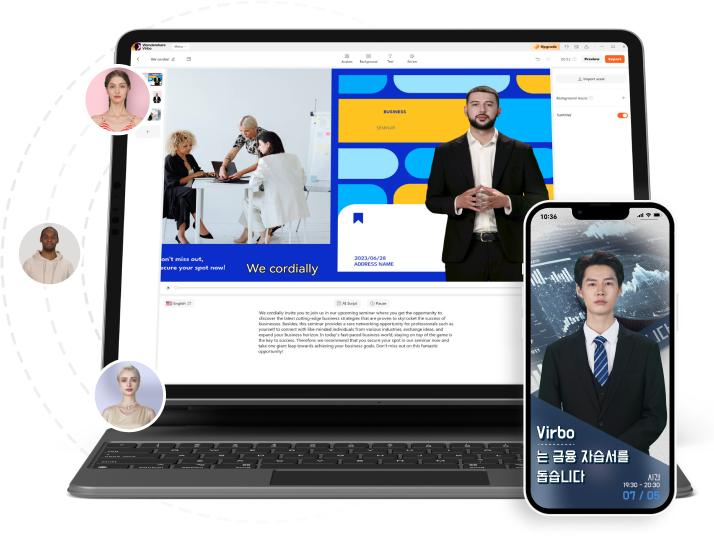
Integrating text-to-speech voice cloning software in your content strategy can help you with multiple things. This section will discuss multiple benefits such tools have to offer throughout the industry:
- Interactive Conversations: These tools use advanced speech recognition technology to produce natural speech. Their use enhances the element of interaction in your content, such as in virtual assistants and customer care.
- Voiceover Personalization: Once these tools have cloned your voice, the next step is TTS technology. You just need to add text, and AI will transform it into your voice. It plays a significant role in marketing and maintaining brand image.
- Language Versatility: The cross-regional language support enables voice cloning in other languages. This increases the reach of your content/brand across borders, ultimately increasing leads and recognition.
- Cost-Friendly and Productive: Everyone knows that AI aims to help humans achieve goals faster. Besides task atomization, these tools cost less than half of what brands pay to voice actors.
Part 2: Top Speech-to-Speech Cloning Tools in 2024
There are many tools to refer to when it comes to speech cloning. However, if you prefer online voice cloners, this section can help you. Below are some of the industry’s leading AI tools to clone voices efficiently:
1. Fliki – Voice Cloning
Compatibility: Online
Generate seamless AI voice clones with this voice clone text-to-speech tool. It can clone your voice from a 2-minute short sample and create high-quality voiceovers using prompts. This tool’s manual recorder lets you record your voice on the spot.

Key Features
- It has a library of 1300+ AI voices that fulfill diverse voiceover purposes.
- The tool supports over 75 languages, and you can generate voiceovers.
- Users can integrate multiple emotions in AI voices, like cheerfulness, anger, sadness, or more.
Get Started Online Download APP Now Free Download
2. Murf AI – Voice Cloning
Compatibility: Online
Robotic voices can be non-distracting; however, they cannot engage the audience. This voice clone TTS tool can clone your voice depending upon the requirements. In addition, users can personalize voice elements like pitch, pronunciation, and emphasis.

Key Features
- The tool works on TTS technology, which helps you change voiceovers via script.
- It addresses all privacy concerns via automated AI encryptions.
- Its “AI Dubbing” feature enables users to dub the content in a range of languages.
Get Started Online Download APP Now Free Download
3. Speechify – AI Voice Cloning
Compatibility: Online
Create a precise, professional-sounding AI voice with Speechify’s TTS voice cloning feature. The tool simply requires a 30-second audio sample of your voice to craft a voice clone. Users can opt for either instant recording or browsing files.

Key Features
- Simply copy-paste or type your text to create a voiceover with this one-click AI voice cloner.
- Once a voiceover has been generated, you can preview it and modify its volume or pitch.
- With this tool, you can emphasize words/sentences or add emotions at specific durations.
Get Started Online Download APP Now Free Download
4. LOVO AI – AI Voice Cloning
Compatibility: Online
Whether it’s your voice or a celebrity’s voice, this speech cloning tool can work with both. The results are precise, and the tool maintains voice quality via clarity. You can use custom script options to design the voiceover accordingly.

Key Features
- There are built-in voice clones of celebrities like Ariana Grande, Drake, etc.
- Users can share a voice sample or record it in a peaceful environment.
- The pre-built AI voices and the cloned voices sound non-robotic.
Get Started Online Download APP Now Free Download
5. ElevenLabs – AI Voice Cloning
Compatibility: Online
Upload a few minutes of audio sample or record it to get a personalized AI voice. This voice cloning TTS shows effortless compatibility with 29 languages and 50+ accents. The tool compares the original and AI voice if you select a different language or accent.

Key Features
- Besides instant outcomes, the tool serves ultra-realistic AI results.
- It has advanced security integrations enabling secure voice cloning.
- A sample of 30 minutes to 3 hours is recommended for precise outcomes.
Get Started Online Download APP Now Free Download
6. Podcastle – AI Voice Cloning
Compatibility: Online
This speech-to-speech voice cloning feature has introduced a “Revoice” feature. At its core, it is designed to clone your voice so that you can use it repeatedly. Afterward, Podcastle enables its TTS to function for writing or adding scripts to generate custom voiceovers.

Key Features
- This tool uses a 70-sentence strategy that you have to read as a sample for precise results.
- The AI-cloned voice you request is ready for use within 24 hours.
- Offers cloud storage where you can save all cloned voices in the “AI Voice” section.
Get Started Online Download APP Now Free Download
Conclusion
This article focused on the perks of using speech-to-speech voice cloning technology for content generation. You can use any of the above-discussed tools if you prefer online tools. Wondershare Virbo was discussed as a professional tool to generate compelling voice clone copies. It isn’t confined to voice cloning but offers 300+ AI voices and avatars for effective communication.
Complete Guide of Top Video Language Translators
The fusion of diverse cultures and languages has become a hallmark of innovation. At the forefront of this linguistic revolution arevideo language translators , powerful tools reshaping how we perceive and engage with multimedia. This guide is a gateway into the transformative realm of video translation, where the convergence of technology and language transcends barriers. Our exploration will unveil the top 8 video language translators, each a beacon in the quest for seamless, cost-free, and automated ways to translate video content.
Part 1: Rise of Video Language Translators and Its Impact on Innovative World
In the ever-expanding digital frontier, the ascent ofvideo language translators marks a paradigm shift in how information transcends linguistic boundaries. This section unravels the transformative impact of these tools, delving into their role as catalysts for innovation in a globally interconnected landscape.
01 Redefining Cross-Cultural Communication
As the world becomes a digital tapestry woven with diverse languages and cultures,video language translators emerge as key facilitators, breaking down the barriers that once limited the reach of multimedia content. Explore how these tools redefine the landscape of cross-cultural communication, enabling seamless interaction and understanding.
02 Enabling Globalized Content Creation
The impact ofvideo language translators extends beyond mere translation, fostering a truly globalized and inclusive digital sphere where ideas flow seamlessly. Dive into how these tools empower content creators to transcend linguistic constraints, unleashing a wave of creativity that resonates with audiences around the world.
03 Bridging Communities through Shared Narratives
Innovative world-building involves more than technology; it’s about fostering connections and understanding. Discover howvideo language translators act as bridges between communities, enabling individuals and businesses to share their stories, ideas, and innovations with a worldwide audience.
04 Empowering Collaboration and Knowledge Exchange
As we explore the impacts, recognize how these translators empower collaboration and knowledge exchange on a global scale. They facilitate a free flow of information, transcending language barriers and enabling individuals from diverse backgrounds to contribute to the collective pool of global knowledge.
05 Shaping a Future of Inclusivity
Join us in understanding the profound influence these translators wield in shaping our innovative world, where the fusion of languages not only facilitates communication but also propels us into a future where collaboration and understanding know no linguistic bounds. Explore how these tools contribute to a future marked by inclusivity, where the richness of diverse languages enhances the global exchange of ideas.
Part 2: Explore Top 7 Translators to Translate Video Free
In this part, we will explore the top 8 video translators that stand out for their ability to seamlessly translate videos without putting a dent in your budget. From user-friendly interfaces to robust language support, each of these tools brings something unique to the table. Join us as we navigate the features and functionalities that make these translators the go-to choices for those seeking efficient and cost-free ways to translate video content.
1. Wondershare Virbo
In the fast-paced world of digital content creation, the ability to communicate with a global audience is a game-changer. Virbo, a cutting-edgevideo language translator app, steps into this arena, offering content creators a dynamic platform to transcend linguistic barriers and connect with viewers worldwide. As we delve into Virbo, let’s explore its unique features, advantages, and considerations.

Get Started Online Free Download
Features
- Whether you’re a seasoned creator or just starting, its user-friendly layout ensures a smooth and efficient experience.
- Its advanced speech recognition ensures accurate and nuanced translations, enhancing the audiovisual appeal of your content.
- It ensures that you can translate content dynamically as you create, providing instant feedback on how your video will resonate with a global audience.
Pros
- Its intuitive design ensures that creators of all levels can navigate the app seamlessly.
- It’s a versatile tool for connecting with diverse audiences.
- It ensures a secure environment for content creation and translation.
Cons
- It offers an offline mode; some features may be limited without an internet connection.
- For new users, the array of features may require some learning.
2. Google Translator
Standing as a beacon of versatility, Google Translate emerges as a leading video audio translator app. It supports a multitude of languages. It goes beyond traditional translation methods, offering real-time translation through the camera. Whether your content is spoken or written, it provides a user-friendly solution for diverse video translation requirements.

Features
- It boasts an extensive language repertoire, supporting a vast array of languages, making it a versatile tool for global content translation.
- It excels in translating written text. Its text translation capabilities are robust and cover a wide range of linguistic nuances.
- A standout feature is the real-time camera translation, enabling users to translate text in images or videos instantly through their device’s camera.
Pros
- It has a user-friendly interface, making it accessible for users with varying levels of technological expertise.
- It eliminates financial barriers, allowing a broad user base to benefit from its language translation features.
- It regularly updates and improves its translation algorithms.
Cons
- It may still face challenges in accurately translating complex or context-specific phrases.
- Its certain features depend on an internet connection, limiting functionality in offline scenarios.
3. Papago
Hailing from South Korea, Papago has garnered international acclaim for its accuracy and efficiency. This app supports real-time translation for both text and voice, ensuring that language is no longer a barrier in everyday scenarios or critical business meetings. Papago’s commitment to precision positions it as a reliable companion in the realm of global communication.

Features
- It accurately capturing spoken language and converting it into text, providing users with a seamless and efficient way to communicate across language barriers.
- It is known for its accuracy and efficiency in translating both text and voice.
- It provides a comprehensive range of supported languages, catering to diverse user needs.
Pros
- It incorporates human expertise, adding a nuanced touch to translations that goes beyond literal meaning
- It brings a unique perspective and precision to its translations.
- It offers offline functionality.
Cons
- It may be less known globally compared to some other translation apps.
- The interface may be perceived as more complex for users seeking a simpler design
4. Microsoft Translator
In the world of text and voice translation, Microsoft Translator takes the spotlight. This free and accessible tool caters to content creators seeking seamless translation for spoken content in their videos. Its user-friendly interface and wide language support make it a go-to choice for creators of

Features
- It boasts an extensive language portfolio, covering a diverse range of languages to facilitate global communication.
- It excels in text and voice translations, providing users with flexibility in how they choose to communicate across language barriers.
- It ensures accessibility for users with varying levels of technical expertise.
Pros
- It is recognized for its accurate speech recognition.
- It allows users to translate content directly within familiar Office tools.
- It enables multiple users to work together on translating content.
Cons
- It may face challenges in achieving the same level of fluency.
- Some advanced features may depend on a consistent internet connection.
5. SayHi
Venturing into the realm of voice translation, SayHi captures attention with its real-time translation capabilities. Ideal for creators looking forvideo language translator app toauto translate video in different languages, it provides a seamless experience for translating spoken words, enriching the audiovisual dimension of your videos.

Features
- It allows users to engage in live conversations and create dynamic multilingual content effortlessly.
- It supports a wide array of languages, enabling users to translate spoken words seamlessly across diverse linguistic contexts.
- It features a user-friendly interface, making it accessible for users of various language proficiency levels and technical expertise.
Pros
- It allows users to perform translations without the need for a continuous internet connection.
- It enables users to store commonly used phrases for quick and easy access during conversations.
- It enhances the precision of translations for specific regional or contextual language nuances.
Cons
- It may face challenges in accurately capturing the nuanced complexities.
- Some advanced features may depend on an internet connection.
6. Veed.io
In the realm of onlinevideo language translator , Veed stands out as a comprehensive platform that goes beyond the ordinary. With its integrated automatic subtitle generator and translator, it brings a new level of efficiency and creativity to content creation.

Features
- It excels in simplifying the subtitle creation process through its automatic generator, significantly reducing the time and effort required for manual transcription.
- The platform stands out with its translation feature, enabling creators to connect with a global audience by converting subtitles into various languages, promoting inclusivity.
- It offers a seamless integration of video editing tools, allowing users to enhance their content within the same platform, eliminating the need for multiple applications.
Pros
- It enables a smooth and efficient content creation process, saving time and effort.
- Its interface is user-friendly, ensuring a positive experience for creators at various skill levels.
- It allows users to access their projects from anywhere with an internet connection.
Cons
- It relies on a stable internet connection.
- It may not provide the depth of advanced editing tools.
7. Amara
Diving into the collaborative side ofvideo language translator, Amara shines as a community-driven platform for creating and translating subtitles. This open approach allows content creators to crowd source translations, ensuring accuracy and inclusivity in the subtitles for their videos.

Features
- Amara is a pioneer in collaborative subtitle creation, allowing multiple users to contribute to the translation and refinement of subtitles for a video.
- It supports a variety of languages, facilitating the creation of subtitles for videos targeted at diverse global audiences.
- It embraces a crowd sourced approach to translation, enabling communities to work together on translating content accurately and efficiently.
Pros
- It ensures a diverse set of perspectives for accurate and contextually relevant subtitles.
- It makes video content more inclusive for audiences with hearing impairments.
- It supports various subtitle formats, providing flexibility for content creators.
Cons
- Users unfamiliar with the platform may experience a learning curve.
- It primarily focuses on subtitle creation.
Conclusion
In conclusion, the availability of topvideo language translators has transformed the way we engage with content across linguistic boundaries. Whether you are a student, a professional, or a casual viewer, these tools empower you to access a wealth of information in your preferred language. As technology continues to advance, the impact ofvideo language translators on our interconnected world is only set to grow, fostering a global community where communication knows no linguistic limits.
The Best Translator to Translate Videos Online
Translating the videos is the only way to expand your connection with a large audience. You can change the audio in the video or add subtitles in various languages to make the video more attractive. We will be going to discuss afree online video translator that fulfills the needs of translation.
Part 1. Translate Video to Any Languages Online: Virbo
If you want to translate video online without hassle, try Wondershare Virbo . If we talk about its compatibility, it supports Windows and mobile apps and is also available on the web. It does not require installations; you can use its features on any web browser with the help of the Internet.
Whether it’s about translating videos, adding subtitles, or transforming your videos into a masterpiece, Virbo is an all-in-one place. It helps to create engaging videos without consuming much time or cost. It supports multiple translating languages such as English, Spanish, Hindi, etc. Reach the audience across the world by translating videos into multiple languages. Virbo offers 180+ templates, royalty-free music stock, generated AI scripts, and customized videos according to your needs.
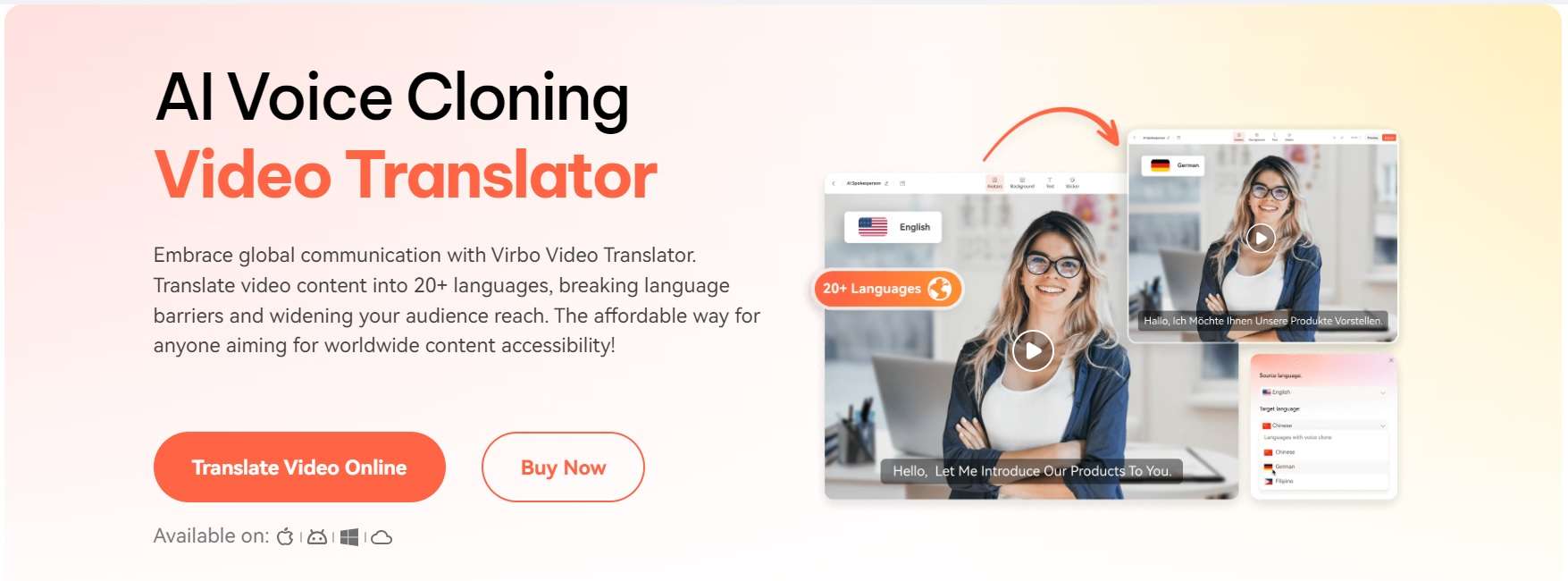
Translate Video Online Download APP Now Free Download
01 Unique Features of Virbo
1. Generate a script for the video
If you want to record a podcast and don’t have time to write the script manually, try the AI script generator of Virbo. Users can generate scripts effortlessly in their desired languages. It allows you to generate a script within seconds to enhance your marketing skills.
2. Add AI voice to the video
Generate a real-human voice for your videos to add a realistic look. It offers 120+ voices or languages, which you can select according to the type of video. AI voice generates a clear voice without any background noise or distortion. It allows you to customize the voice, such as adjusting speed, pitch, volume, etc.
3. Choose templates for the video
Virbo has a built-in library of 180+ templates. You can customize the templates and make your video professional. Users can find categories in templates, such as social media, advertisement, E-commerce, etc.
02 Steps to Translate Video in Virbo
Here is the step-by-step guidance for translating videos or adding subtitles in other languages.
Step 1: Open the Virbo and Create a Sign-up account
Go to the Wondershare Virbo and open its interface or just click “Translate Video Online” to access the Video Translator tool. Create a sign-up account to use the functionality of Virbo. Virbo is anonline video translator that allows you to translate video to English or other languages subtitles.
Translate Video Online Download APP Now Free Download
Step 2: Translate video to other languages
Click on the video translator and upload your desired video file. Select the language of the original video and the target language, which will be the translated language. After this, click on the “translate this video” button. You can download high-quality videos with a single click.
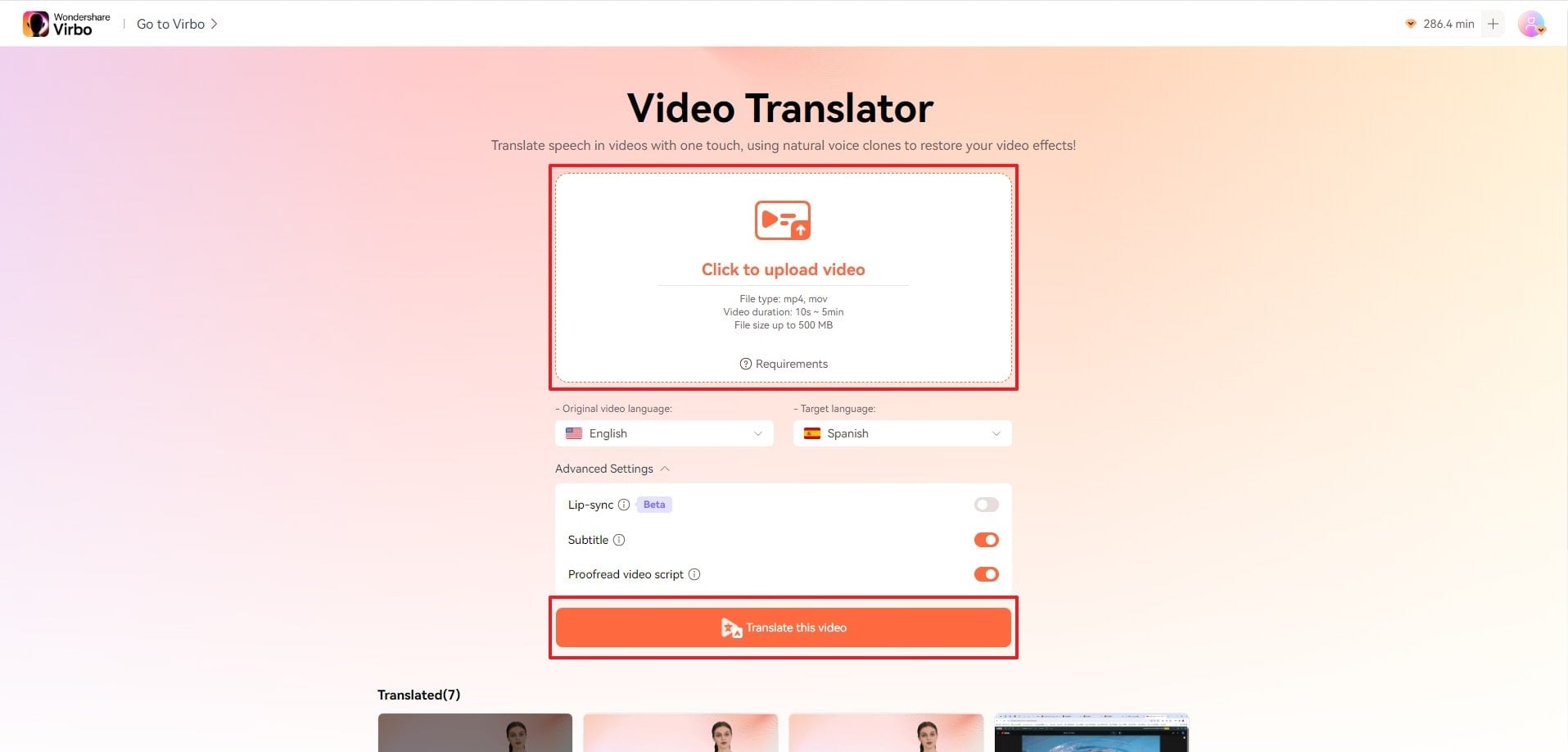
Add subtitles by importing your videos in the editing interface of Virbo. Write subtitles to the video and translate it into your desired language.
Step 3: Export your video in a high-quality format
Click on the export button to save your video in the tool. Click on “My creations” to see your recent or previous videos. Download the video to your device.
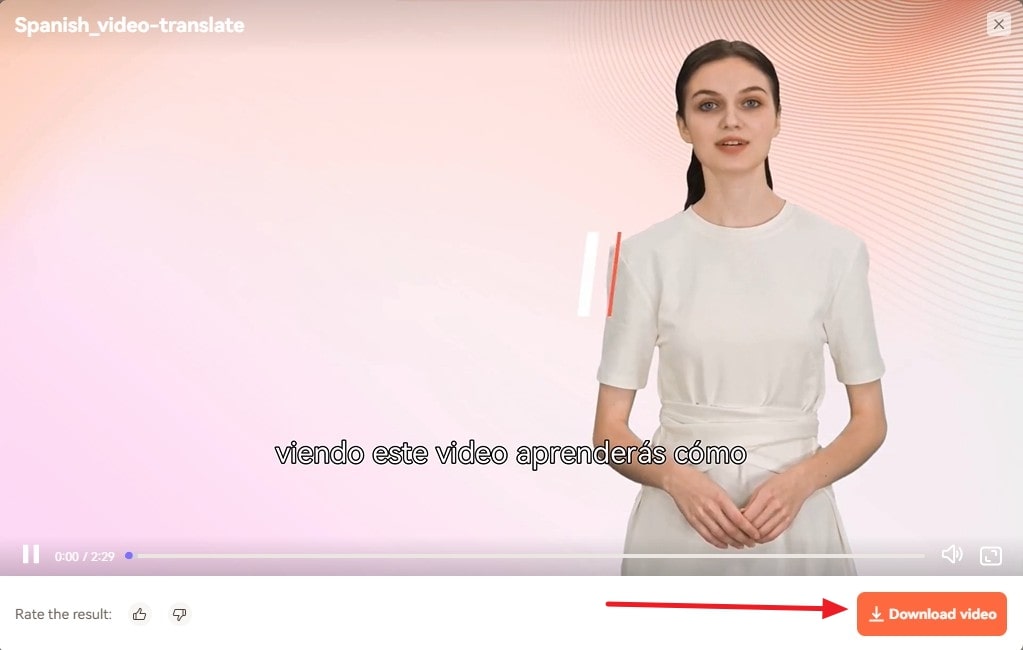
Translate Video Online Download APP Now Free Download
Part 2. What Challenges Can Occur if Video Translators Do Not Exist
Videos play a crucial role in delivering the message worldwide. People prefer to create video advertisements instead of putting ads in newspapers. Colorful and catchy videos grab the attention of the viewers and encourage them to buy the product. The main problem can occur if your target audience cannot understand the language that you have used in videos.
As we all know, English is one of the most spoken languages. But not everyone speaks or understands it. People can face various problems in understanding the language. That’s why video translators play a crucial role in every person’s life. If there is no video translator, the world will become dull. Let’s discuss some challenges that can occur if video translators do not exist.
1.Communication Gap Formed
If your viewers understand the Spanish language, but you are creating videos in other languages. It will create a communication barrier because your audience does not understand the language in the video. Language barriers can affect communication and lead to misunderstandings. Suppose you are posting video lectures on the website to offer courses. In this case, if you don’t use a video language translator, it will misinterpret the viewers.
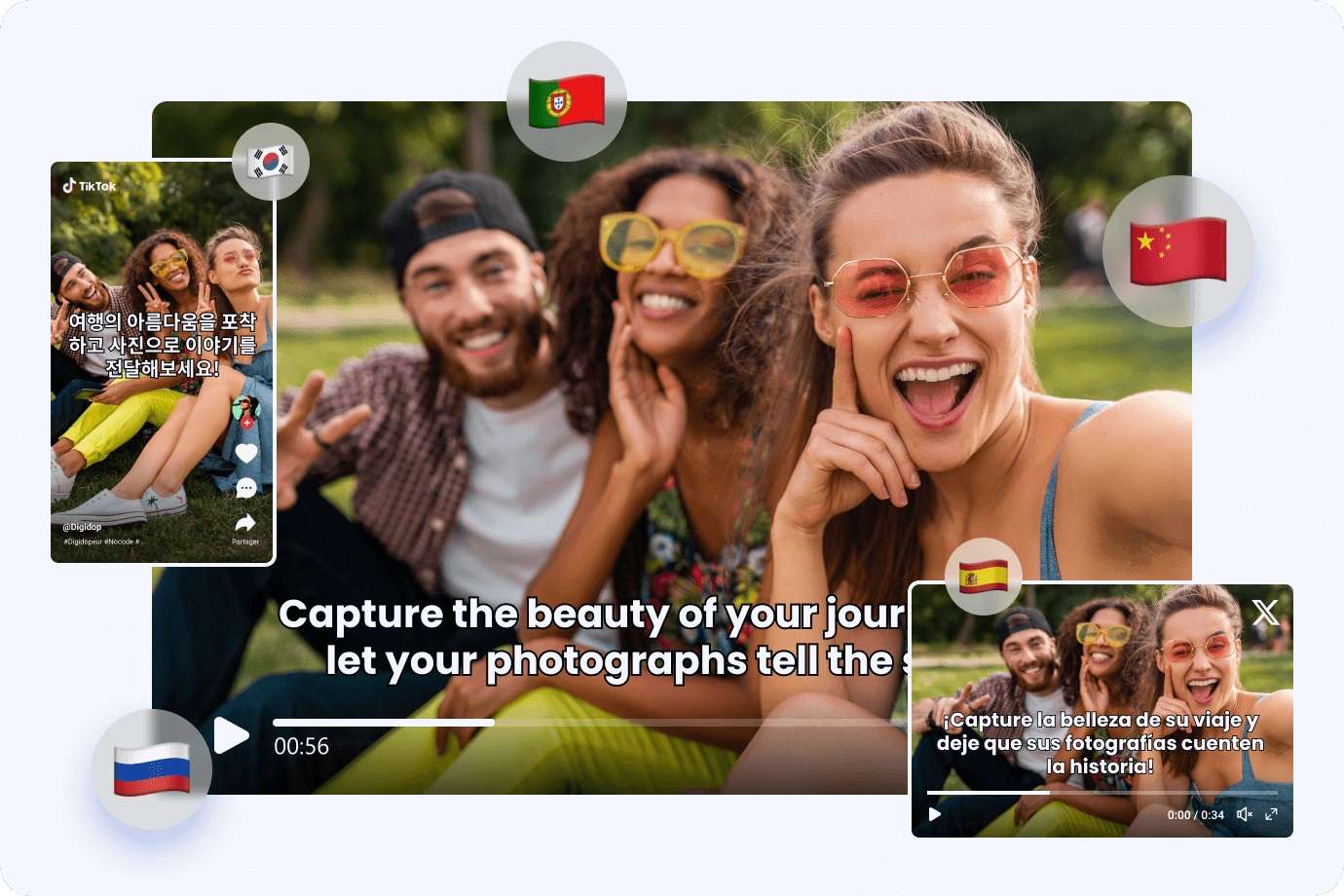
2. Failed to Reach a Large Audience
In this modern world, people create videos for marketing purposes. What happens if the translators do not come into our lives? If your target is to reach a large audience that will see your videos and love your content, then you need a video translator.
Without a translator, viewers will skip your content, and you cannot reach to a broad audience. Video translators can provide subtitles or translate the audio into video, which will help to boost the connectivity.
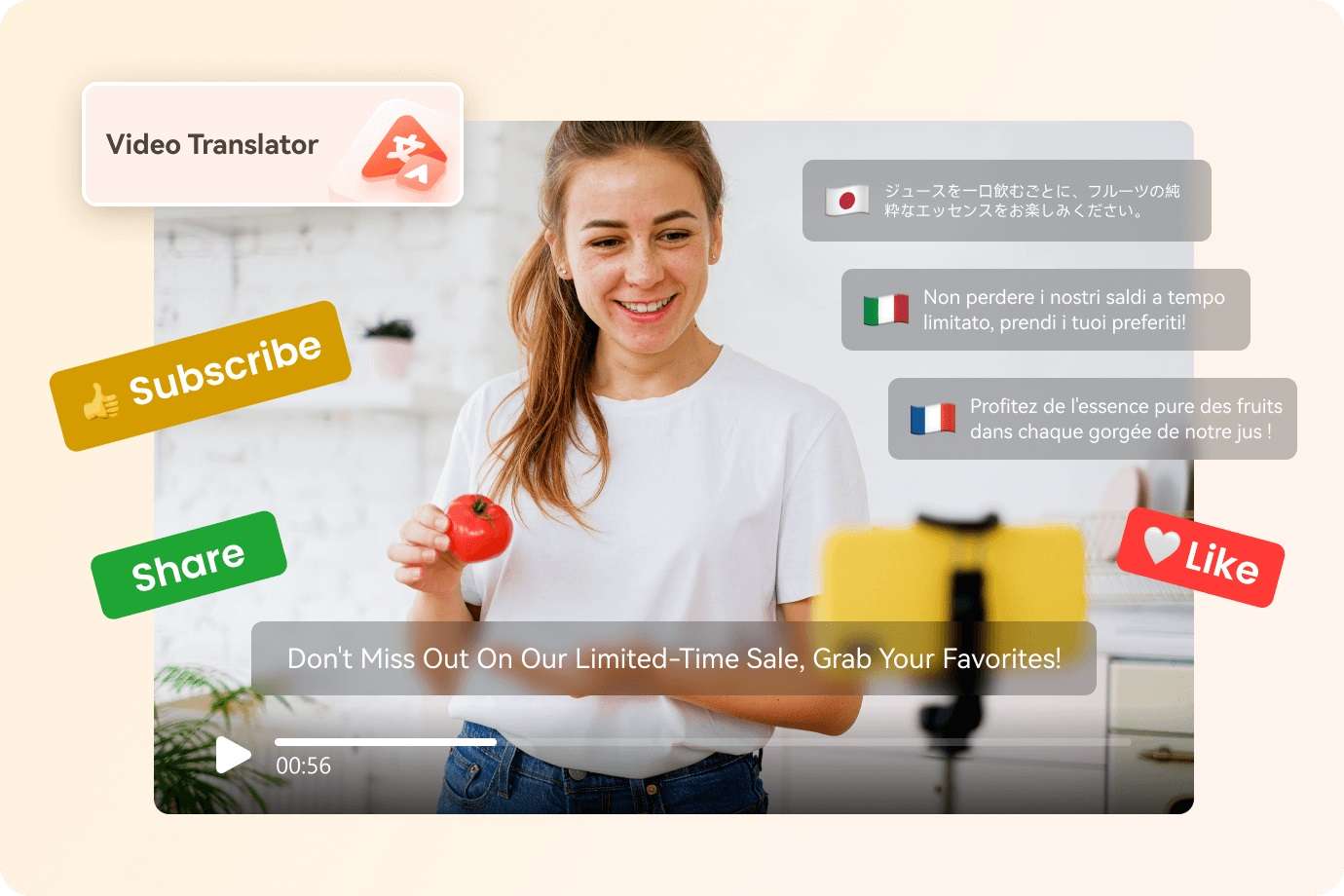
Part 3. Tips to Choose the Best and Free Online Video Translator
A variety of tools are available in the market thatauto-translate video online . But the important part is which one is best? How can you select the best video translator? People usually invest a lot of money and choose the translator without knowledge. We are exploring some tips that will assist you in choosing the best video translator.
- Budget-friendly Video Translator
- Compatible With Various Operating Systems
- Intuitive Interface
- Supports Multiple Video Formats
- Supports Various Languages
- Instant Video Translation
Conclusion
If you want to translate a video to English subtitles online for free or in other languages, choose the best video translator. A good video translator assists users in expanding their audience and connecting them to your content. Wondershare Virbo is one of the best tools to translate videos online to create engaging videos. Add kinds of music, avatars, voices, subtitles, templates, and much more to your videos.
Translate Video Online Download APP Now Free Download
What Is ChatGPT?
What is ChatGPT?
Developed by OpenAI, it’s a cutting-edge language model designed to engage in natural and dynamic conversations with users. Let’s dive into the intricacies of ChatGPT, its capabilities, and the world it opens up.
What Can I Do With ChatGPT?
Users can interact with ChatGPT by asking a wide array of questions and sharing prompts. It’s not just about straightforward queries; ChatGPT is designed to engage in creative, informative, and entertaining discussions. Users can seek explanations, brainstorm ideas, get writing assistance, create conversational agents, and much more.
ChatGPT serves as a versatile tool for a myriad of applications:
- Content Generation: Create articles, stories, and essays with ChatGPT’s assistance, exploring various writing styles and tones.
- Learning Aid: Receive explanations and clarifications on complex topics, making learning more interactive and accessible.
- Idea Exploration: Brainstorm ideas for projects, products, or creative endeavors by conversing with ChatGPT.
- Programming Help: Receive coding suggestions, debug assistance, and explanations for programming-related queries.
- Language Translation: Translate phrases and sentences into different languages, bridging communication gaps.
What are the limitations of ChatGPT?
While ChatGPT is a remarkable achievement, it’s important to acknowledge its limitations:
- Lack of Context: ChatGPT doesn’t have memory of past interactions in a conversation, leading to occasional context gaps.
- Generating Inaccuracies: It can sometimes provide incorrect or nonsensical answers that sound plausible.
- Sensitive Content: ChatGPT’s responses might inadvertently contain biased or offensive content despite efforts to prevent it.
- Over-Reliance on Prompts: The quality of responses can vary depending on how prompts are phrased.
What are the alternatives to ChatGPT?
Several alternatives to ChatGPT exist for various purposes:
- DialoGPT: Another OpenAI creation, DialoGPT specializes in engaging in more coherent and context-rich conversations.
- Rasa: A framework for building conversational AI, allowing customization of chatbots for specific needs.
- IBM Watson Assistant: An AI-powered chatbot platform that integrates with various business applications.
Conclusion
ChatGPT, the brainchild of OpenAI’s innovation, is transforming the way we interact with AI. From creative brainstorming to educational support, it opens doors to endless possibilities. However, it’s crucial to approach its insights with discernment, understanding its limitations. As technology evolves, ChatGPT and its alternatives continue to shape the landscape of AI-driven conversations, bridging the gap between human and machine communication.
What is ChatGPT?
Developed by OpenAI, it’s a cutting-edge language model designed to engage in natural and dynamic conversations with users. Let’s dive into the intricacies of ChatGPT, its capabilities, and the world it opens up.
What Can I Do With ChatGPT?
Users can interact with ChatGPT by asking a wide array of questions and sharing prompts. It’s not just about straightforward queries; ChatGPT is designed to engage in creative, informative, and entertaining discussions. Users can seek explanations, brainstorm ideas, get writing assistance, create conversational agents, and much more.
ChatGPT serves as a versatile tool for a myriad of applications:
- Content Generation: Create articles, stories, and essays with ChatGPT’s assistance, exploring various writing styles and tones.
- Learning Aid: Receive explanations and clarifications on complex topics, making learning more interactive and accessible.
- Idea Exploration: Brainstorm ideas for projects, products, or creative endeavors by conversing with ChatGPT.
- Programming Help: Receive coding suggestions, debug assistance, and explanations for programming-related queries.
- Language Translation: Translate phrases and sentences into different languages, bridging communication gaps.
What are the limitations of ChatGPT?
While ChatGPT is a remarkable achievement, it’s important to acknowledge its limitations:
- Lack of Context: ChatGPT doesn’t have memory of past interactions in a conversation, leading to occasional context gaps.
- Generating Inaccuracies: It can sometimes provide incorrect or nonsensical answers that sound plausible.
- Sensitive Content: ChatGPT’s responses might inadvertently contain biased or offensive content despite efforts to prevent it.
- Over-Reliance on Prompts: The quality of responses can vary depending on how prompts are phrased.
What are the alternatives to ChatGPT?
Several alternatives to ChatGPT exist for various purposes:
- DialoGPT: Another OpenAI creation, DialoGPT specializes in engaging in more coherent and context-rich conversations.
- Rasa: A framework for building conversational AI, allowing customization of chatbots for specific needs.
- IBM Watson Assistant: An AI-powered chatbot platform that integrates with various business applications.
Conclusion
ChatGPT, the brainchild of OpenAI’s innovation, is transforming the way we interact with AI. From creative brainstorming to educational support, it opens doors to endless possibilities. However, it’s crucial to approach its insights with discernment, understanding its limitations. As technology evolves, ChatGPT and its alternatives continue to shape the landscape of AI-driven conversations, bridging the gap between human and machine communication.
How To Create Video From Text Easily [Step-by-Step]
Artificial Intelligence or AI has revolutionized video creation, making it faster and easier for creators to produce a video within minutes. Through algorithms and neural networks , you can nowgenerate videos from text .
OpenAI’s Sora, for example, has been a hot topic for its ability to create ultra-realistic videos from text. This technology has the potential to transform the way we approach content creation across numerous industries. Creators of all backgrounds and skill levels can create professional-looking content with minimal effort.
If you are interested in this new technology, this article will provide you with insights and practical steps onhow to create videos from text .
Part 1. How To Use OpenAI’s Sora Video Generator
While Sora is the most advanced and leading video-to-text AI generator by far, it’s currently only accessible to “red team” researchers and not available to the public. OpenAI has not yet specified a public release date for Sora, though it is likely to be sometime in 2024.
Once it’s available to use for the public, you can use Sora on their official website . Follow these steps onhow to use OpenAI’s Sora video generator :
- Step 1: Write the prompt
You will need to start providing a detailed written prompt outlining the content you wish to see in your video. This prompt could include descriptions of scenes or any specific visual elements you envision.
- Step 2: Generate the AI video (max. 1 minute)
After submitting your written prompt, Sora’s AI model will analyze and interpret your text, generating a video that encapsulates the essence of your prompt. The resulting video will last no longer than one minute.
- Step 3: How to create longer videos
For those who want to produce longer videos, you may need to add additional details or scenes and synchronize them with the desired frame count to create a cohesive narrative.

Part 2. Sora Alternative: How To Create Video From Text
If you’re seeking an alternative to Sora forcreating videos from text , you can try using invideo.io. Invideo.io presents itself as an effective text-to-video generator tool designed to transform textual content effortlessly into video.
InVideo.io features:
- Accessibility through mobile apps for convenient video creation on the go
- Live chat support
- Collaboration tools that facilitate teamwork and shared project management
- An extensive library boasting a diverse collection of videos, stock photos, and music tracks
How tocreate video from text with ease:
- Step 1: Go to the invidio.io website and create an account.
Tocreate videos from text with invideo AI, you’ll need to create an account on its website . Once you are signed in, access its text-to-video AI tool to begin creating your videos.
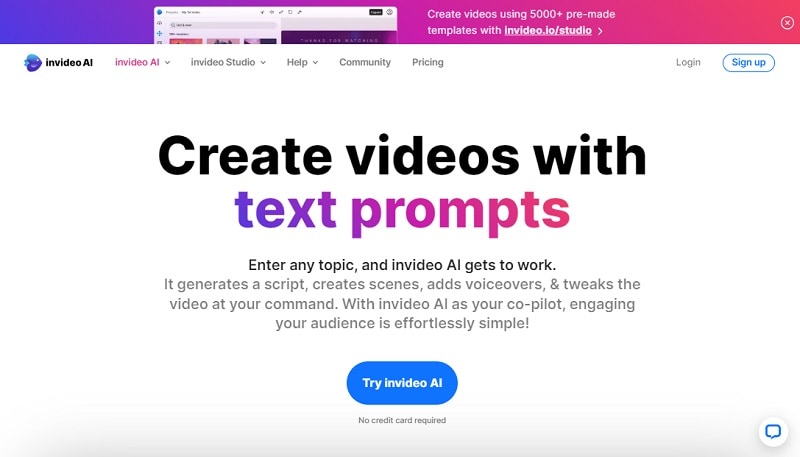
- Step 2: Input the text prompt.
Once you are on the interface, you can input your prompt. Give clear and detailed instructions for optimal results, and click the “Generate a video” button to proceed.
For example, we will use this prompt to generate the video:
A realistic video showcasing the evolution of urban landscapes from the 20th century to the present day, highlighting architectural styles, infrastructure advancements, and societal changes. Incorporate visuals of iconic buildings, city skylines, transportation systems, and cultural landmarks to illustrate the transformation over time.
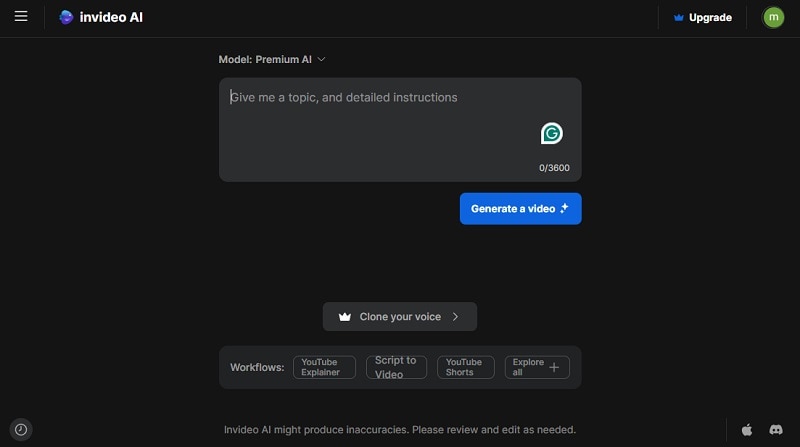
- Step 3: Adjust the settings.
The tool will then analyze your text prompt. Then, you’ll get to rename the title and choose the audience, look and feel, as well as which platform to use. Click continue and allow for a few minutes until it is finished generating the video.
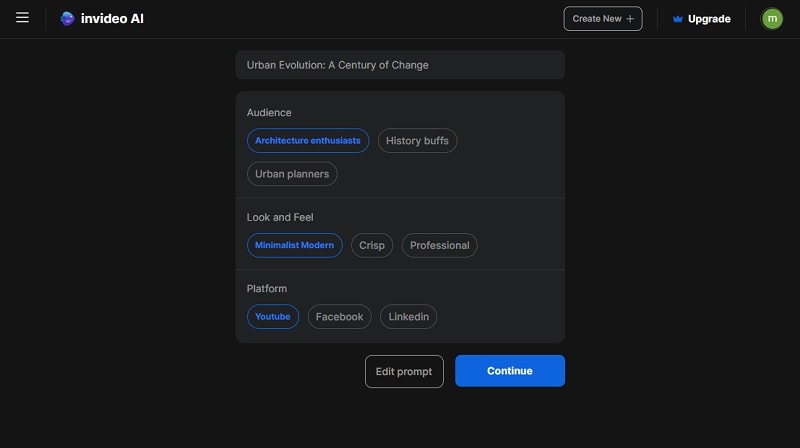
- Step 4: Finalize and export the generated video.
Once your video is completed, you can edit it further by giving the command in the box under your video. You can also edit your script or add your own footage by clicking “Edit.” After you are satisfied with the result, click Export to download the video.
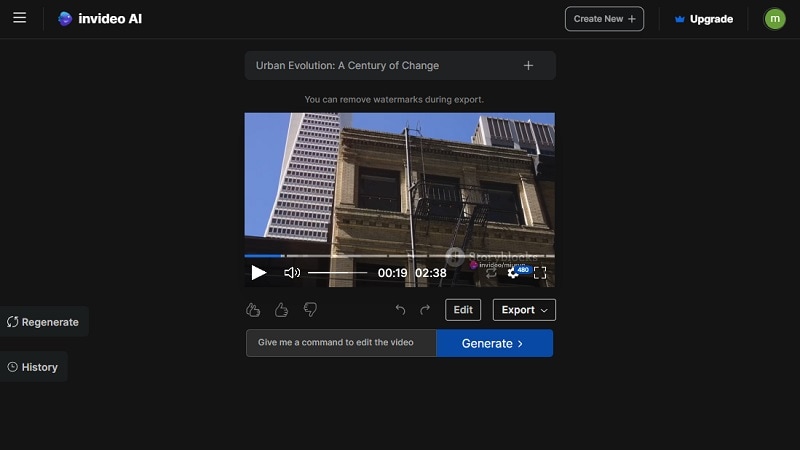
Note: The free version of InVideo includes a watermark. To remove the watermark, you can subscribe to one of their plans.
Part 3. Tips for Writing Prompts To Generate Videos From Text
The key tocreating AI videos from text is a good prompt. Unlike text-to-image generators, creating video prompts needs greater detail and clarity. With a good prompt, you can effectively guide the AI model in understanding the desired visual elements, narrative structure, and emotional context of the video.
Here, we list a few tips to create good prompts for generating videos from text:
- Provide context
When crafting your AI video prompt, include specific information such as desired style, target audience, intended platform for posting (e.g., YouTube), and preferred tone (e.g., casual or formal). You can also indicate if you want high-definition video, like 4K videos.
- Be clear and specific
Although providing details is important, avoid unnecessary things that could confuse AI text-to-video generators. Keep your prompt clear and focused to ensure the AI understands your instructions accurately.
- Use descriptive language
Given that the AI will transform your text into videos, use descriptive language to depict characters, settings, actions, and objects vividly. This will help the AI create a more accurate representation of your vision.
- Incorporate keywords
Some AI video prompt platforms may support the use of tags or keywords to help generate video according to our intent. Use these keywords to influence the AI’s output effectively.
- Structure the prompt effectively
Organize your prompt in a logical manner to ensure clarity and coherence. Start with an introductory sentence that summarizes the main idea or theme of the video. Then, break down the key elements or scenes you want to include.
Moreover, pay attention to scene transitions. In case you need multiple scenes, make sure they transition smoothly to maintain a coherent flow whengenerating videos from text .
Part 4. How To Convert Video to Text Easily with Video-to-Text Tool
To elevate your video further, you can convert your video to text easily using Wondershare Virbo’s Video Translator tool, which functions as a reliable video-to-text generator. You can add subtitles, captions, or transcriptions to your videos within minutes.
Some key features of Virbo’s Video Translator tool are:
- Accommodates translation into more than 20 languages
- Automatically transcribes and synchronizes lip movements into multiple languages
- Accessible on different platforms (Android/iOS/Windows/web)
- High accuracy in converting spoken dialogue into written text
How to use Wondershare Virbos’s Video Translator tool:
- Step 1: Install and launch Wondershare Virbo.
If you haven’t, download and install Wondershare Virbo on your computer and launch the software. Then, select the Video Translator tool within the interface.
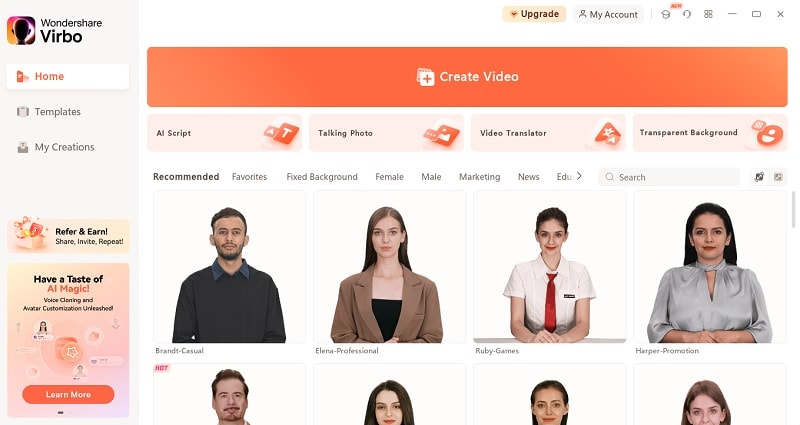
Get Started Online Free Download
- Step 2: Upload your video and adjust the settings.
Click on the designated box to upload your video file. Then, select the languages for both the original content and the desired translations. You can also opt to include subtitles or synchronize lip movements as per your preference. Click “Translate Video” to proceed.
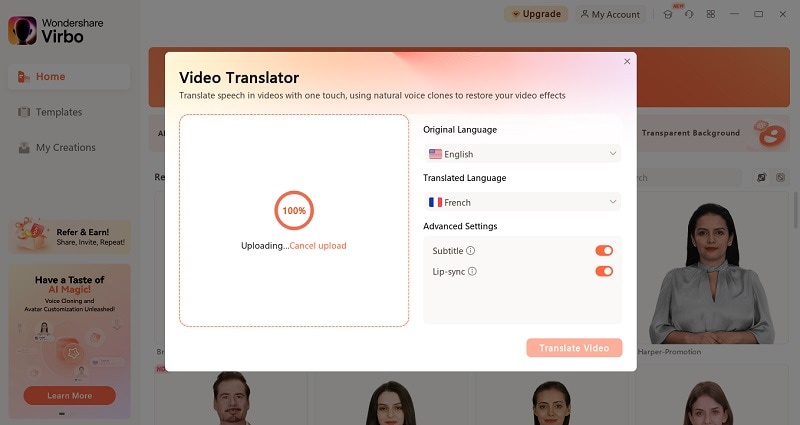
- Step 3: Preview and download the video.
After a few minutes, you will get to see and preview the video result. Once satisfied, click the download button to save the video.
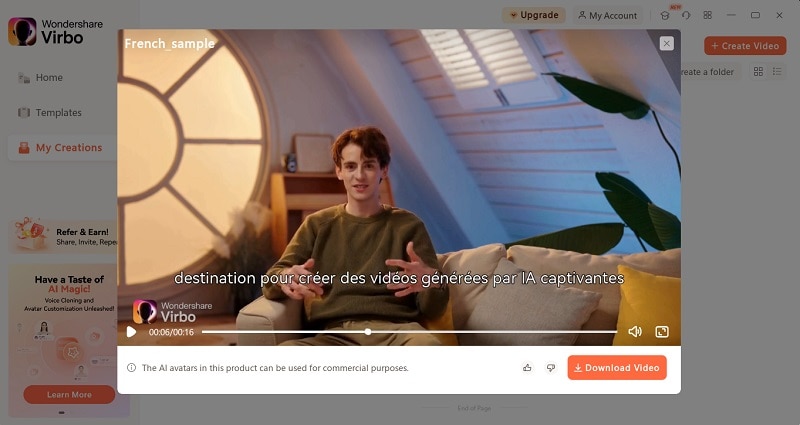
Conclusion
The advent of AI has ushered in a new era of video creation, where generating videos from text has become a reality. OpenAI’s Sora stands as a prime example of this transformative technology. This AI model offers the promise of ultra-realistic video generation from textual prompts.
In this article, we have coveredhow to create video from text in easy ways, so you can stay ahead in harnessing the power of AI. Moreover, tools like Wondershare Virbo’s Video Translator also use AI to enhance the video production process further by converting videos into text.
With the right tools and knowledge, you can unlock endless possibilities in video production and elevate your content to new heights.
Also read:
- [Updated] In 2024, Amplifying Your YouTube Presence Through Consistent Content Release
- 5 Easy Ways to Fix Speaker Buzzing Sound
- AI Avatars | Online for 2024
- Bring Back Retro Gaming: Run Doom on the Compact Raspberry Pi Pico Unit with Easy Setup Guide
- Complete Tutorial to Turn GIFs to Stickers [Discord/WhatsApp/Telegram] for 2024
- Effective Solutions for Correcting lame_enc.dll DLL Conflicts in Audacity Audio Converter
- How to Unlock Huawei P60 PIN Code/Pattern Lock/Password
- In 2024, 6 Ways To Transfer Contacts From Honor Magic 5 Pro to iPhone | Dr.fone
- New 2024 Approved Revealing Translation Methods Netflix Subtitle Software Comprehensive Guide
- New 2024 Approved Text To Speech | Online
- New In 2024, Registration and Login
- New Live Deepfakes Made Easy How to Download and Make Your Own Live Model
- New Registration and Login for 2024
- No Money, All FCP – Unveiled Methods
- Registration and Login | Virbo AI Live Stream
- Revolutionized iOS Screenshot & Recording Methods
- Troubleshooting PC Bugs for a Smooth 'Grounded' Gaming Experience : Tips and Guides
- Updated In 2024, Top 6 Free Talking Stock Photo Sites
- Updated In 2024, What Is AI Influencer?
- Title: Updated What Is an AI Video Editor?
- Author: Sam
- Created at : 2025-01-31 00:03:18
- Updated at : 2025-01-31 23:50:21
- Link: https://ai-voice-clone.techidaily.com/updated-what-is-an-ai-video-editor/
- License: This work is licensed under CC BY-NC-SA 4.0.

